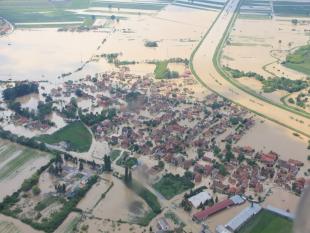Background:
Flood events pose the largest natural hazard risk in the UK with over 5.4 million properties currently vulnerable to floods in England and Scotland [EA (2020), SEPA (2018)]. Government institutions are responsible for reducing the environmental and economic impacts for at-risk communities. Flood hazard assessments are performed to understand the risks posed and implement engineering interventions to reduce societal damages [Kundzewicz et al. (2017)]. These flood risk assessments identify exposed areas, and drive warning and adaptation planning. Hydraulic models are key components used to quantify flood hazard risk and exposure analysis [Balica et al. (2013); Zhou & Arnbjerg-Nielsen (2018); Beevers et al. (2020); Nkwunonwo et al. (2020)]. These complex numerical models create a dichotomy for modellers who face the choice between accuracy (controlled by model resolution) and ever-increasing computational demands [Aitken et al. (2022)]. Historically models have been run in a deterministic fashion providing one potential flood extent. More recently there is a move towards probabilistic modelling, providing ensemble predictions for future flood events. However, the computational burden associated with such assessments is large and can make these prohibitively expensive.
Data-driven methods provide new and exciting opportunities to reduce both the computational burden of running ensembles, as well as reducing the computational burden of the hydrodynamic model itself, perhaps through replacing parts of the process engine with novel advanced statistical methods.
Aims and Objectives
The aim of this PhD is to explore the potential for hybrid modelling in probabilistic flood modelling for climate change adaptation. Hybrid modelling is an emerging field, where ML and statistical approaches: (i) have been embedded within process-based models; or (ii) where ML or statistical algorithms have been used to replace certain components of the coupled model system. This PhD will explore the potential for hybrid model to reduce computational burden and to capture model uncertainties.
Further Information:
The University of Edinburgh is committed to equality of opportunity for all its staff and students, and promotes a culture of inclusivity. Please see details here: https://www.ed.ac.uk/equality-diversity
Closing Date:
Principal Supervisor:
Assistant Supervisor:
Eligibility:
Minimum entry qualification - an Honours degree at 2:1 or above (or International equivalent) in a relevant science or engineering discipline*, possibly supported by an MSc Degree. Further information on English language requirements for EU/Overseas applicants.
*An undergraduate degree in Civil or Environmental Engineering; or Physical Geography, or potentially Mathematics or Statistics
Funding:
Tuition fees + stipend are available for Home/EU and International students.
Informal Enquiries:
Prof Lindsay Beevers: l.beevers@ed.ac.uk



